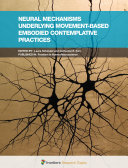

Most ebook files are in PDF format, so you can easily read them using various software such as Foxit Reader or directly on the Google Chrome browser.
Some ebook files are released by publishers in other formats such as .awz, .mobi, .epub, .fb2, etc. You may need to install specific software to read these formats on mobile/PC, such as Calibre.
Please read the tutorial at this link: https://ebookbell.com/faq
We offer FREE conversion to the popular formats you request; however, this may take some time. Therefore, right after payment, please email us, and we will try to provide the service as quickly as possible.
For some exceptional file formats or broken links (if any), please refrain from opening any disputes. Instead, email us first, and we will try to assist within a maximum of 6 hours.
EbookBell Team

5.0
40 reviewsRelative to the extensive neuroscientific work on seated meditation practices, far less studies have investigated the neural mechanisms underlying movement-based contemplative practices such as yoga or tai chi. Movement-based practices have, however, been found to be effective for relieving the symptoms of several clinical conditions, and to elicit measurable changes in physiological, neural, and behavioral parameters in healthy individuals. An important challenge for neuroscience is therefore to advance our understanding of the neurophysiological and neurocognitive mechanisms underlying these observed effects, and this Research Topic aims to make a contribution in this regard. It showcases the current state of the art of investigations on movement-based practices including yoga, tai chi, the Feldenkrais Method, as well as dance. Featured contributions include empirical research, proposals of theoretical frameworks, as well as novel perspectives on a variety of issues relevant to the field. This Research Topic is the first of its kind to specifically attempt a neurophysiological and neurocognitive characterization that spans multiple mindful movement approaches, and we trust it will be of interest to basic scientists, clinical researchers, and contemplative practitioners alike.